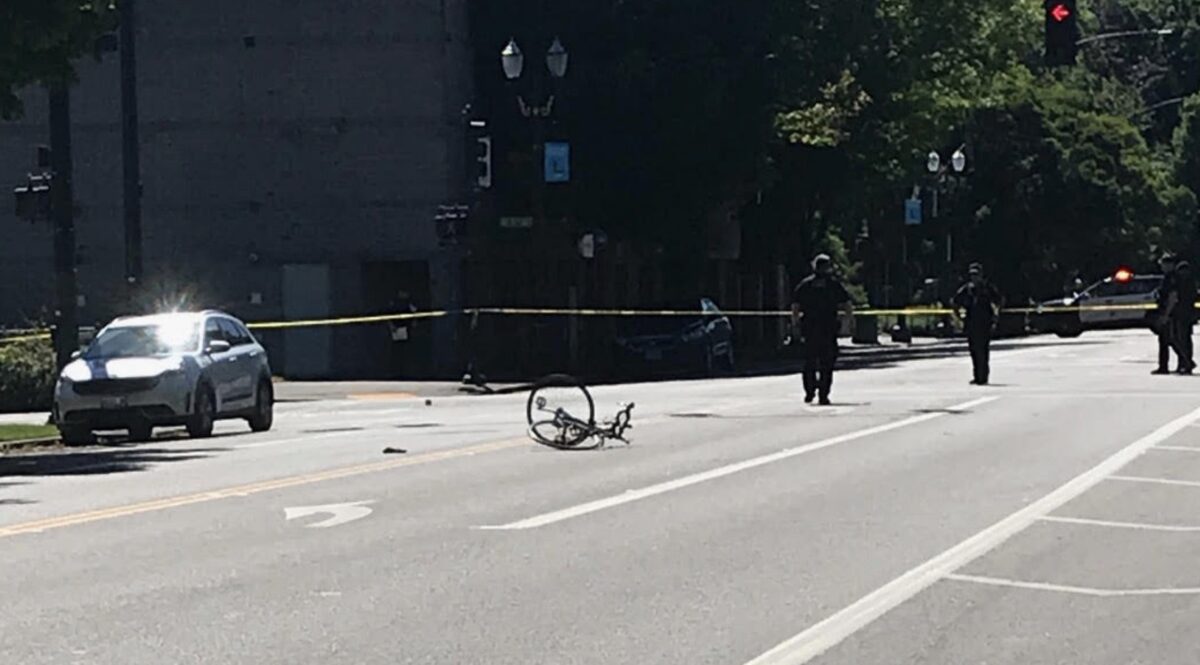
(Photo sent in by a reader)
*Note: Please see major update at end of story
Around 3:00 pm on Monday (6/22) someone riding a bike was involved in a collision with the driver of a car in the Lloyd area.
It happened in the intersection of Northeast 16th and Multnomah. We don’t have many details at this time, but according to the Portland Police Bureau the bicycle rider suffered trauma-level injuries and was transported to a hospital. “The vehicle operator was cooperative and remained at the scene,” said a PPB Public Information Officer. No word yet on charging decisions or what type of behaviors preceded the collision.
A BikePortland reader rolled past shortly after it happened, snapped a photo, and spoke to an investigating officer. “I asked if someone was hit and hurt. He said yes and it doesn’t look good,” the reader shared.
Advertisement
The photo shows the victim’s bicycle at rest in the left-turn lane of westbound Multnomah (see red circle in photo above). Multnomah in this location has an unprotected, curbside buffered bike lane in the westbound direction and an unprotected door-zone bike lane going eastbound. NE 16th has unprotected bike lanes going north and a shared-lane that transitions to a bike lane going south. Both streets are key, cross-town links in the bike network.
If anyone has more information, we’d be curious to know what went wrong here. We’ll update this post if/when we hear anything further from the PPB. Stay vigilant out there everyone. The relatively quiet streets we had during the lockdown are considerably louder and busier these days.
UPDATE, 2:30pm: The bicycle rider has died. The PPB just released this statement:
The investigation suggests the bicyclist did not stop for a red light while travelling southbound on Northeast 16th Avenue. The driver of the vehicle, who was travelling eastbound on Northeast Multnomah Street had a green light. Due to two vehicles waiting in the left turn lane at Northeast Multnomah Street, it was nearly impossible for the driver to see anyone running the red light southbound on Northeast 16th Avenue. The driver remained at the scene and fully cooperated with police.
The bicyclist was transported to the hospital where he later died. The bicyclist has been identified as 37-year-old Troy Demont Calvin. Anyone who witnessed this incident or has more information is asked to contact Officer Garrett Dow at (503)-823-5070 or Garrett.Dow@portlandoregon.gov
Based on the police description (which we can’t verify is accurate at this time), here’s a diagram to help explain where the vehicles were prior to the collision:
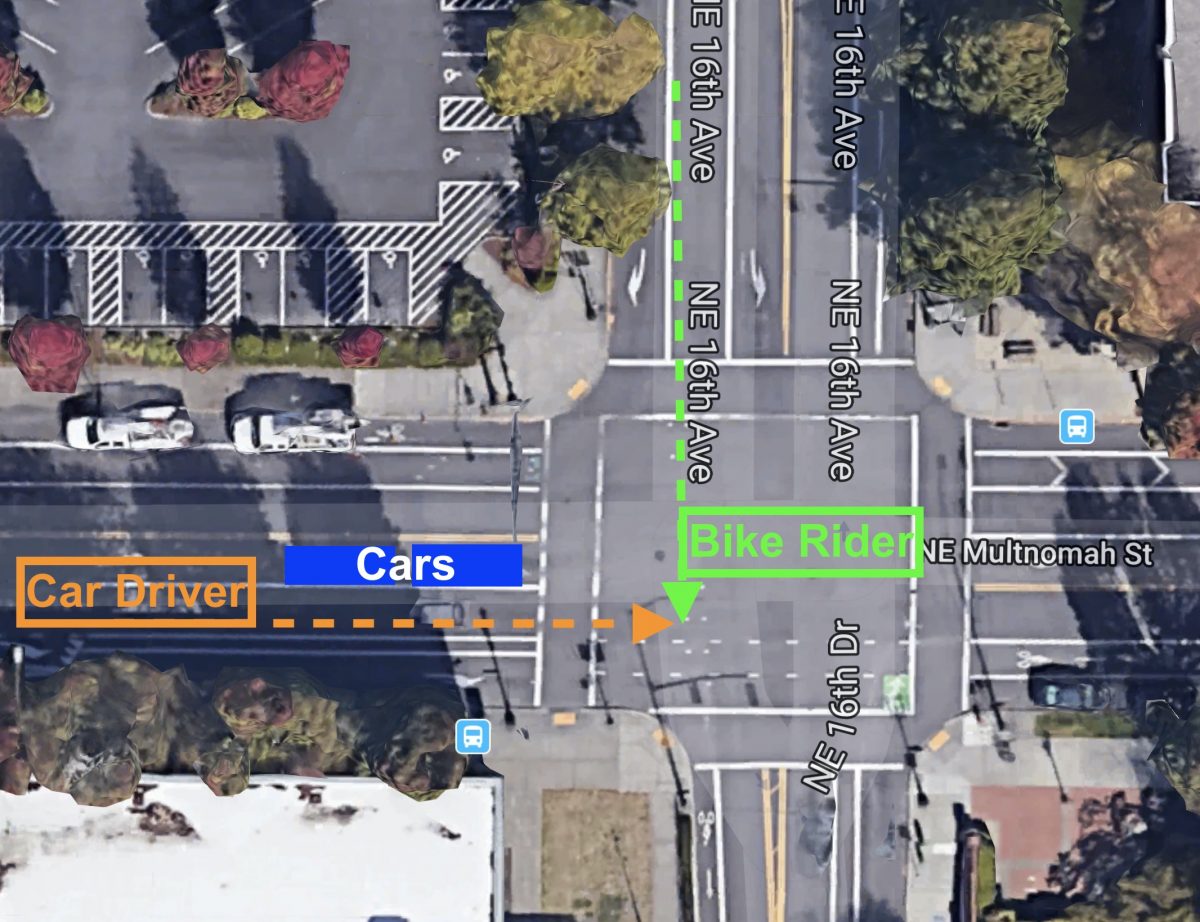
— Jonathan Maus: (503) 706-8804, @jonathan_maus on Twitter and jonathan@bikeportland.org
— Get our headlines delivered to your inbox.
— Support this independent community media outlet with a one-time contribution or monthly subscription.



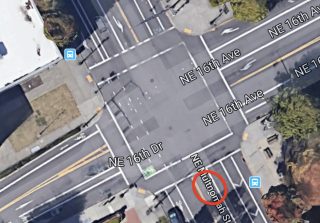
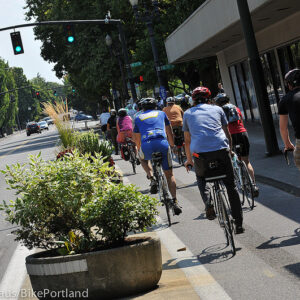

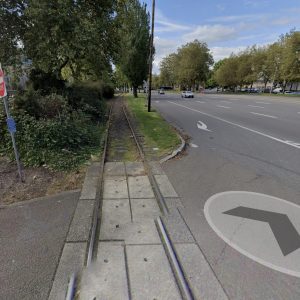
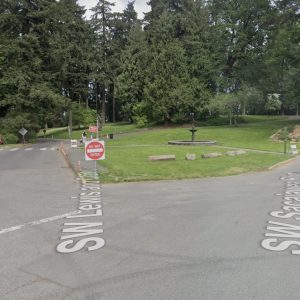
Thanks for reading.
BikePortland has served this community with independent community journalism since 2005. We rely on subscriptions from readers like you to survive. Your financial support is vital in keeping this valuable resource alive and well.
Please subscribe today to strengthen and expand our work.
Rest in peace Troy
Praying for a quick and complete recovery for the rider.
Be Safe Out There!!!
God Bless!
First off, this is just terrible news. My best wishes go out to the rider and their family.
It got me wondering what a non-police response to this incident would look like. Presumably an unarmed team of crash investigators (who would be doing something else (what?) during the bulk of the time they weren’t investigating crashes, but would be big enough to handle at least two incidents simultaneously) would show up and do something similar to what the police to today.
Would the crash team be able to take statements from witnesses in the same manner as a police officer? Presumably yes. Would they be able to administer an alcohol test to a reluctant and potentially belligerent driver? Would they be able to issue traffic tickets or make an arrest? Search or impound a vehicle if there was cause to do so? Or would they call in someone else to do those things? If so, who? (and would that mean more people responding to a crash?) What if the driver has a warrant out against them?
If the driver panicked and tried to leave the scene, would they then call for backup, or give chase/restrain the driver themselves? (Being unarmed investigators, I presume they would not.)
Having never been involved in or been a close witness to one of these events, I’m not sure what other eventualities need to be covered, but it’s probably worth thinking through if we’re serious about defunding the police. And if we’re serious about transferring police funding (that pays for stuff like this) to social service agencies, would this special team of investigators (with their potential backup) be cheaper or more expensive than the police who are currently doing this job?
[On a slight tangent, I did see the aftermath of a mid-level collision in Europe, and it struck me that one of the tasks of the first responders was sweeping up all the debris from the crash and otherwise “sanitizing” the scene to the extent it was essentially invisible the next morning. Not sure how that works here, but I do see post-collision debris around from time to time, so at least some remains on the street.]
Vehicular pursuit of a fleeing suspect is quite dangerous. Some police departments have changed policies to prevent police chases, and most have strict policies on when a chase is allowed and how it should be done. In this case the deadly weapons are the 2 speeding motor vehicles. See https://www.pursuitresponse.org/deciding-to-pursue-or-not-to/ and https://www.portlandoregon.gov/police/article/652386
These reports always twist me in a knot. In the time between the accident and when we know what happened two things go through my mind. The first is that my emotional brains hopes it was the fault of the distracted, rotten motorist and not the good and noble cyclist. But that would mean it is random and could happen to me or one of my loved ones. On the other hand, if the cyclist ran a red light then my logical brain can say, ” I never do that so I am safe.” But either way my heart goes out to the injured cyclist and I hope they pull off a full recovery.
It’s likely more nuanced than that, and very difficult when the injured party can not give or statement or often has no memory of the incident. I like to think that no one rides so recklessly they knowingly imperil their life and there are always other factors involved like signal timing or sightlines.
Did the deceased rider enter the intersection on the yellow? Was the driver already going 30mph on a steady green? Did the police find cameras in the area that show the crash, or is this based off of one or two witness statements? Vision Zero aims that even when humans make mistakes they wont be fatal ones. Regardless, these statements absolutely infer blame with the victim (are they even investigating anymore?) and will be difficult for family members to read. Incredibly sad.
In cases like this, that probably means “roundabout”. Conventional intersections fail the “not fatal” test if either party (or both) disobey the signal, unless we can find a way to limit actual vehicle speeds to 20ish MPH.
Roundabouts require more room, which means taking property, and limiting speeds means who knows what (super aggressive speed bumps everywhere?). This all means that achieving VZ in cases like this will be extraordinarily expensive and/or difficult and/or politically unpopular, especially since this design represents essentially all our intersections.
I disagree with you. This intersection has several turn lanes which would not be needed for a roundabout design. Its also not the only possible solution to reduce speed.
Please stop.
You sound like a distracted and rotten motorist. /s
A person died from this and we have readers on this forum who have some sort of weird fantasies that the driver is an evil mustache twirling villain. Nobody wins here.
Agreed. Like everyone who hops in their car is just waiting for the chance to mow someone down.
Yes. Sentiment like this is causing great harm to the cycling movement; all it does is drive resentment towards cyclists and it accomplishes nothing. One of my good friends cycles to work every day and has for years, but refuses to identify as a cyclist or as part of the movement precisely because of how much some people the cycling crowd in Portland makes it an “us versus them” against drivers. We’re alienating the very people who we should be trying to recruit.
But yes, I’d like to extend my condolences to everyone involved in this crash. A terrible situation all around; I feel for both the driver and the family of the cyclist who now have to live with this.
Can you give an example of some manifestation of these fantasies in these comments?
Mostly I see discussion centered around the role of infrastructure in contributing to dangerous situations. Plus maybe some people just trying to get their heads around how this terrible outcome might’ve come to pass.
Bikeninja’s comment didn’t come across that way to me at all.
Responding to Toby:
Bikeninja’s comment didn’t come across that way to me at all. He was obviously exaggerating–not really believing all drivers are villains any more than he really believes that all cyclists are “good and noble”. He even described that as the thinking of his “emotional brain” for those who might take his words literally.
To make it even clearer, he then went straight to saying that the cyclist may have run a red light, and thus been at fault.
I believe Bikeninja was expressing that no matter what caused the crash, there is no solace. Finding out something was caused by chance, by evil, by carelessness by either party…none really give comfort or reassurance. I have a similar reaction when I read about the death of someone doing something I do, and at least some other people do, too. Turning that thoughtful comment into some sort of “us vs. them” stance takes it the opposite way of what he was expressing, in my opinion.
I really hate hate hate these statements by the police that effectively blame the cyclist for his own death. We’ve all approached intersections on our bikes going 10-15 mph and been caught in the middle of the intersection when the light turns red, simply b/c the timing of the light is designed for cars going 30 mph. If a car is going 30-40 mph and the cyclist is still in the intersection, the cyclist is going to be in trouble.
Also, in 95% of collisions between motor vehicles, both drivers are able to testify later about what happened. When a cyclist is run down by a car or truck, the cyclist almost never has the chance to give the other side of the story. I’ve known cyclists who were hit and survived but had no memory of what happened.
These statements by the police should provide more information about what evidence police used to reach their conclusions, such as:
Otherwise these statements sound like half-baked conclusions. “It’s really impossible for a driver to have seen the bike” sounds like a statement by the driver in question, though the driver may sincerely believe it to be the case. But the job of the accident investigator is to judge whether that statement has veracity and then reach a conclusion based on professional judgment, not merely parrot the driver – or even sound as though it is parroting the driver. Contrast the following:
“It was impossible to see the bike” vs
“The driver stated that he did not see the bike as it entered the intersection. Investigator simulated the conditions and could not see bike til x feet and therefore judged the claim has veracity.”
The bottom line for me is that police still treat these situations as “Too bad, very sad, nothing anyone could have done,” when we need for them to rise to the seriousness of the situation. Otherwise cyclists will continue to die in this unequal car-centric world, and the more cyclists die, the fewer people will ride bicycles.
We don’t know if he pushed a yellow or ran a stale red. It’s possible that there are statements from other witnesses, given that the diagram above shows there were several vehicles stopped in the left turn lane. These vehicles could have obstructed the view of the cyclist from the perspective of the driver going eastbound.
Hard to imagine the cyclist ran a yellow.
E/B Multnomah has left turn pockets with left turn signal phase. The cross street (NE16th) gets red signal, then cars in the Multonomah left turn pocket get a left turn green arrow, then they get a red arrow and cars proceeding straight on Multnomah finally get their green light. All this time NE 16th has a red light. So if the driver was proceeding straight on E/B Multnomah with cars stopped in the left turn pocket, the S/B NE 16th light had been red for some time.
One possibility is the cyclist was going through the intersection on the yellow-to-red phase (pink light) at over 30 mph and hit the car and driver which was moving 5-10 mph at the beginning of their green phase. I’ve seen a lot of car drivers and bicyclists doing what the cyclist might have been doing, I’ve done it myself, trying to make a last-second crossing even on a red, hoping the cars see them and wait for them to cross. In this case, the outcome has been terribly tragic, I’m sorry to say.
Per Vision Zero, had the bicyclist been moving at under 20 mph when he hit the car, he would have likely survived his injuries. 25-30 is iffy. 30-35 can be quite deadly. And of course injury is compounded if the car driver was also moving over 20 mph, but given the phases I rather doubt the driver was moving any faster than 10 mph.
I don’t know. Looking at the blurry photo, the wheels and frame look intact, so I’d say the bike hit the car rather than the car hit the bike.
The car being heavier had greater forward momentum, so it could have moved the bike out to that location immediately after the initial crash. Or a well-meaning police officer or other person could have moved it. I agree it’s an odd location.
Another possible explanation could be that the driver did not have a green light. It is not clear from the report whether this has been verified by an independent witness. I undersyand that this is speculative, but it seems odd to me, given the preceding green phase for the left turn lane, that the bike ride would have run a red light.
It could be the driver wasn’t starting from a standstill. He could have been approaching from further back, so never got up to the light to stop before it changed. That could be especially likely if the bike rider had been quite late through the intersection.
Rider could also have swerved to his left in an attempt to avoid collision.
In the words of Mike Tyson: “Everybody has a plan until they get punched in the mouth.”
On July 29, 2019 I went over the hood of a left turning Hyundai Sonata while commuting home on Hall Blvd. I landed on my left shoulder and head. The helmet and the bike were totaled. I took an ambulance ride to St Vincent and missed two days of work.
Very few people are going to be able to react fast enough to do any more than think “oh crap”… or in my case *ffffamily blog* this is gonna hurt.
To imagine a bicycle striking a car at 30 mph really takes some doing. It’s not a downhill bomb. In the photo which is not blurry at all, the bicycles front wheel is perfectly round. It would have been smashed into some other shape if it was, in fact, the bike that struck the car.
Also, as I noted earlier. The bike was photographed a full block from the strike point. No ‘well meaning’ police officer carried it there! Finally, “Per Vision Zero” it is incumbent on CARS to be moving under 20 mph in city centers. Cars are the vehicles that mass over 4,000lbs.
One obvious problem with lights is that they are set for car speeds. I am a fast rider, but sometimes I barely make it through a wide intersection before it turns red. I might be going 20 mph, but it is a 45 mph street. It is even worse when I am the only vehicle and the light only turned green because I activated the magnetic strip. Those times I am sometimes in the middle of the intersection when it turns red.
Absolutely. There are lights in Beaverton I call sucker lights. Even if I enter on a valid green I’ve been caught with the light going red when I am half way across.
On those lights I will *stop* or slow down to let it cycle to red. To ensure when it cycles back to green I’ll have the full cycle time to cross the street.
Proceeding west from the Beaverton TC on SW Millikan Way I never just roll into a green to cross SW Cedar Hills Blvd…
Exactly. And in this location, there’s a long distance from entering the intersection to where he was hit. He had to cross a wide crosswalk, a bike lane, a buffer lane, a westbound lane, and a turn lane to get to the eastbound lane where he was hit.
And the police report mentions that the left-turn-lane vehicles obstructed the view of the driver to the cyclist. But that means they also obstructed the cyclist’s view of the driver’s car coming out from behind them.
If the cyclist was caught in the intersection when the light turned red, I feel like the driver would have been fully committed to running a red light on his side, gambling that it was gong to turn green for him. Not that it couldn’t happen, but from what I’m seeing, it sounds like this played out like it was described.
I am wondering on what information this statement is based on:
It seems odd to me that there were cars on the left-turning lane just after it had its green light; I know this intersection and in my experience, that lane in most cases empties out during its green phase.
Likely investigation is based solely on statement from one witness, the person that hit the cyclist.
Plenty of cameras around that immediate area, so I’m assuming it will be obvious to investigators if the witness(es) are lying almost immediately.
There were 2 other cars waiting in the turn lane. It could be those people that provided the description of what happened. Sometimes people make mistakes when riding. I’ve made mistakes when riding and luckily those mistakes did not involve a car and only ended up in broken bones and abrasions. I don’t know what happened here but it is always sad when someone dies in a bicycle crash.
I’d love to hear from anyone who downvoted this totally innocuous comment to explain what you didn’t like about it.
That comment having all those down-votes is what finally made me start the Forums topic about down-voting such comments.
Unsure about the straight southbound lane, but the southbound east-turning lane there will not turn green if you’re on a bike and can’t trip the sensor, unless this has been fixed recently. I’ve waited through multiple light cycles before giving up and ‘running’ the red light.
That could explain why someone biking would go on a red. On the other hand, at 3 PM it seems like there’d be cars going the same direction that would trip the light.
I live at 19th and Wasco, one block north of Multnomah. I was going to Fred Meyer and biked down to Multnomah to turn left (East) but of course I had to look right to check for clearance and I saw all the first responder vehicles flashing away. I headed west for a closer look but was stopped by caution tape.
The view of the downed bike that I got was exactly as in the photo above. What you all need to know is that is actually 17th and Multnomah, a full block east of where the cyclist was supposedly struck. And I can’t imagine that the cyclist hit the motorist. The only way to have been carried so far from the strike point was if they were the one hit.
Seems to me the driver was going very fast. Possibly speeding. This would have caught the cyclist unawares. No one rides south through Multnomah against the light without expecting cross traffic. But the expectation is that it is moving at ~25 mph or so.
In any case, drivers were cued up to turn left apparently. They all were witnesses. Interesting that none have come forward, even anonymously. I just don’t think it is as simple as “cyclist ran red light, oh well”.
It’s and was devastating when I got back from out of town to hear what had happened to my best friend my boyfriend my husband. We were together for 5 and a half months before he died and troy was sincerely happy cheerful out going and even to this day I have melt downs and I will heal to the ground anywhere anytime and just cry on pain no no no why why why.. I did not want to believe this but he is gone and the hospital pretty much killed him 14 hrs later pornued died no excuse for that I am in the process of sweing the Legacy Emanuel Emergency Room Hospital not for the money but because they should have had it under control and they did not Troy was family to me and he is risen why I am who I am mentally socially physically stronger did ever before. Troy and my daughter who is now today sincerely are the angles love you rip always
where you get ur info from
just know he was going to soon and his kids and wife need him.